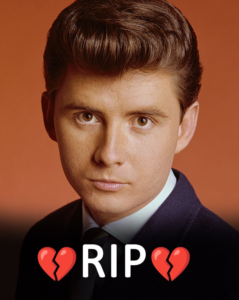Teen Idol Johnny Tillotson, Known for ‘Poetry in Motion,’ Has Passed Away
Johnny Tillotson, the smooth-voiced crooner who rose to fame during the golden age of teen idols in the late 1950s and early ’60s, has passed away. He was best known for his chart-topping hit “Poetry in Motion,” a song that captured the hearts of a generation and etched his name into pop music history. He was 85.
Tillotson’s death marks the end of an era—one that embraced innocence, heartfelt lyrics, and a gentler kind of pop stardom. While the rock ‘n’ roll scene exploded around him, Johnny carved a space of his own, blending pop, country, and a touch of soul to create timeless ballads and catchy anthems of young love.
Born on April 20, 1938, in Jacksonville, Florida, and raised in Palatka, Tillotson grew up with a deep love of music. His voice, unmistakably clear and earnest, won local talent shows and radio contests in his teens. That early spark turned into a career when he signed with Cadence Records in the late 1950s, the same label that launched the Everly Brothers and Andy Williams.
His big break came in 1960 with “Poetry in Motion,” a bouncing, feel-good track that perfectly captured the sweet simplicity of youthful infatuation. The song soared to No. 2 on the Billboard Hot 100 and became an international success. With his clean-cut image, soft features, and dreamy voice, Tillotson quickly became a teen heartthrob.
But Johnny was far from a one-hit wonder. He followed up with other beloved songs, including “It Keeps Right On a-Hurtin’,” a mournful ballad inspired by the loss of his father. The song crossed over to the country charts and showcased a deeper emotional range. Elvis Presley later covered it, a testament to its power and Tillotson’s influence.
Throughout the 1960s, Tillotson continued to record and tour, sharing stages with legends like Patsy Cline, Roy Orbison, and Jerry Lee Lewis. His ability to move between genres—pop, country, rockabilly—kept him relevant, even as musical tastes shifted.
Though the British Invasion and changing trends pushed many early idols out of the spotlight, Tillotson never truly disappeared. He continued performing well into his later years, often appearing in nostalgia tours and special events. Fans adored him—not just for his music, but for his humility, charm, and graciousness offstage.
In interviews, Tillotson often spoke fondly of his fans and the era that made him. “It was a magical time,” he once said. “We sang about love, about longing, about things that mattered to people—still do.”
Johnny Tillotson’s passing is a reminder of a different era of music—one less complicated, where melodies lingered in the air and lyrics were written straight from the heart. He leaves behind a legacy of timeless songs and millions of memories carried in the voices of those who still hum “Poetry in Motion” under their breath.
He may be gone, but the motion of his poetry lives on.
